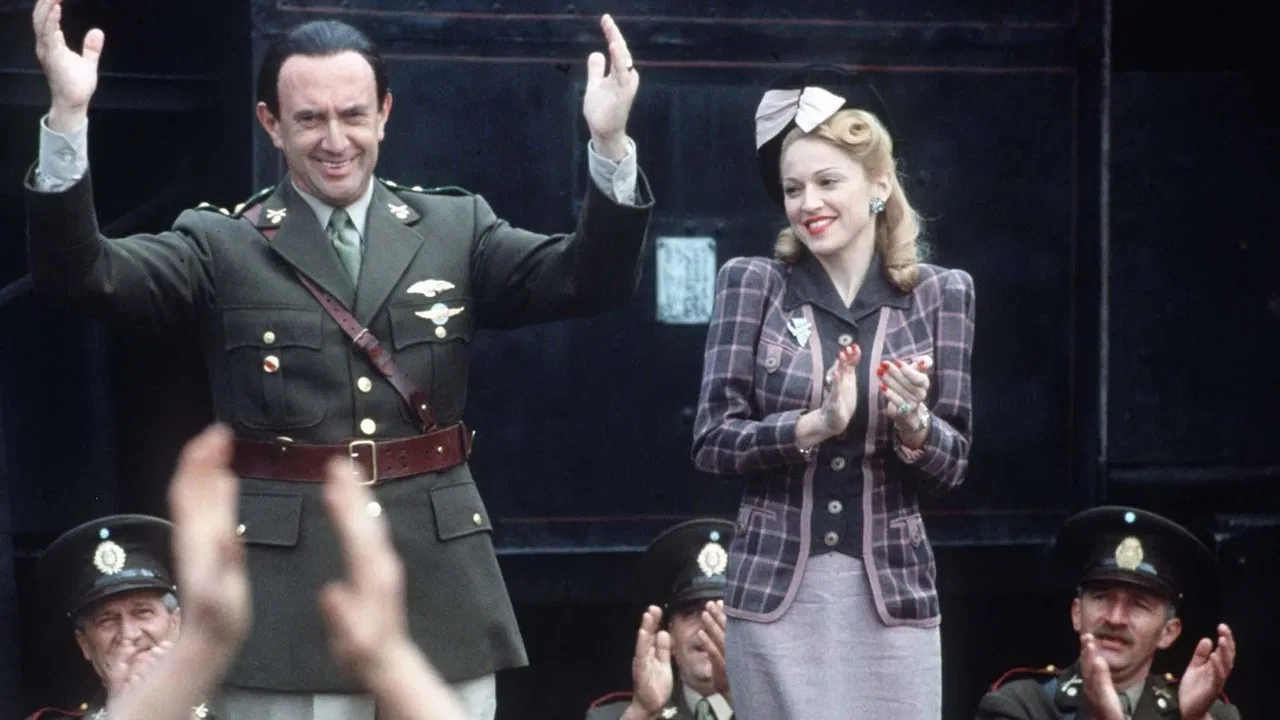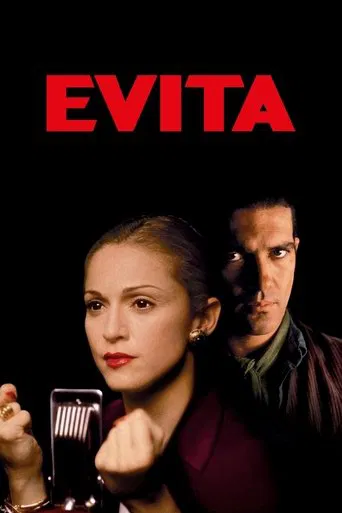

I love Evita and I really love Eva Peron but I worship Madonna.Madonna's a way better actress than Meryl Streep, truly speaking, and I hate making Meryl a martyr (Meryl a martyr Meryl a martyr...) BUT, Madonna, IS, THE, MOST, beautiful and brilliant actress for all ages of time, dead, seriously saying, she sings beautifully like a pure-hearted angel sounding blissfully, oh my God, I'm so heartfelt and I'm so sincere when I say this, sweet holy God, I love Madonna she's so gorgeous she's the hottest woman of all-time, she's also the most beautiful woman of all-time, I love Madonna, real talk, and Madonna's a way better actress than Meryl Streep, easily, really, and there aren't many beautiful woman who can act better than Madonna, for real!Madonna's beautiful, and I love her so much more after watching this now, honestly speaking, like Evita.GOD, I love Evita, a 10 out of 10! Evita's nearly great but you must watch it closely, or you can enjoy it casually as well. Most the music is excellent. Madonna's so beautiful I love her so much God she's gorgeous and Antonio B.'s the greatest he sings so nice and J. Pryce's really nice too!God, I LoVe MADONNA. Just look at her eyes."don't cry for me argentiinaa! the truth is i neever left you. all through my wild days my mad existence i kept my promiise don't keep your distaance"
... View MoreEvita (1996) Director: Alan Parker Watched: 6/20/18 Rating: 7/10 {Clue: "Don't Cry for Me ____"} At more than two hours definitely needs some extra work in the cutting room, Ranges too much in mood and tone- from tragic to comedic to romantic to melodramatic, Gorgeous costumes and set design accompanied by naggingly catchy but lovable songs, Enthusiastically sung "everyman" Greek chorus by a comical-cynical-combative Antonio Banderas, Narrative style ingeniously allows for dual political views in a fun and melodious manner (though unfairly slanted towards the anti-Peronist), Takes Evita's negative personality traits and disproportionately magnifies them- we see an icon rather than the woman, Impersonal performance by a convincing looking Madonna- but was that not Eva María Duarte de Perón in real life: powerfully inaccessible? Not historically accurate in its details- but further research reveals only more mystery and myth, And now most of the world has learned about a woman it would not have otherwise! ---- Acrostic is a form of poetry where the first letters in each line, paragraph, or word are doubly used to spell a name, phrase, or word. The word "acrostic" comes from the Greek words "akros" (outermost) and "stichos" (line of verse). Read the appropriate letters in the poem vertically to reveal the extra message, called the "acrostich"! #Acrostic #PoemReview #Controversy #GoldenGlobesBestPicture #Musical #StageToScreen
... View MoreI first saw Evita on stage locally in my town and I was absolutely blown away. I didn't know musicals could be like that. Absolutely powerful are the words that come to mind when I think of Evita. I was very lucky, because a woman who had actually played Evita on Broadway was doing a production of it in my town and I loved her. Evita is my favorite musical for so many reasons I could write a dissertation on it. But that's not what this is for.One of the main themes of Evita is power in all forms: political power, social power, sexual power. With these themes, you need to have the music and acting to back it up, meaning you need instrumental power, rhetorical power (for the speeches on the balcony), and (most importantly) vocal power.Madonna does not have that vocal power. She does fine, but that's just it. She does fine. The vocal power of the role of Evita isn't just fine. It's jarring, it shakes your very soul (at least for me). Madonna, god she's trying, but she just wasn't the right pick. You need your leading lady to be imposing and her vocals to be incredibly skillful and expert in nature. I kind of have a soft spot for Antonio Banderas because I felt like he brought enough cynicism and biting critique to Ché that it worked even though his voice isn't the best. I'm a firm believe that as long as your acting and character is solid, your singing doesn't have to be the best. I don't really have any strong opinions on Jonathan Pryce as Peròn. He was a bit mediocre but not awful. Like I said, Evita is my favorite musical of all time. Everyone should have some impossible dream (haha Walz for Eva and Ché) and mine is someday playing Eva Perón. I am absolutely obsessed with this musical. This movie just took out so much emotional depth and detail. That's where it's downfall lies.Many will be quite harsh on it because it's pretty much all music (it's an opera, that's to be expected) or because it's boring. And to that I think it comes down to taste. Of course if you don't like musicals or you don't like more historical movies, you're probably not going to like this movie. It's not a complete waste of time. If you have the chance to see Evita on stage I would say definitely go for that over the movie, but if you want to get a bit of a mediocre version, than you can watch it and then listen to the broadway soundtrack and see which one you prefer. Me, I prefer the Broadway revival version with Elena Roger, and Patti LuPone's version is also phenomenal.In short, Evita (1996) simply could have been better.
... View MoreI am a person who hates musicales and I was about to leave the movie in the middle of it. That said and my personal bias out of the way, if I critique this movie I have to be fair. As a Musical and for people who like musicals this is a great film, keep in mind that most of the film is Madonna singing and that there is very little dialog, the only place that there was any dialog in the film we all had to clap in the movie theater just because they spoke and not sing. OK OK time for the truth, the movie is well filmed, it has a coherent historical story, and as for Madonna I think it is one of her best acting movies I have ever seen, she should have at least been nominated for her acting in addition to giving the film an Oscar for the music. The songs especially "Don't Cry For Me Argentina" I think we would all agree it is a classic hit, I loved it. A lot of people did object to Madonna representing Evita Peron, in my opinion whether you like Madonna's life style or not you cannot pull it into the movie it is her life. As for the movie she did act very well and sang even better. Looking back at the movie this movie is definitely thumbs up for anyone that likes musicals, and such style of movies. This is not an action movie it is a musical and one of the best musicals, so please love it as a musical and not as any thing else.
... View More